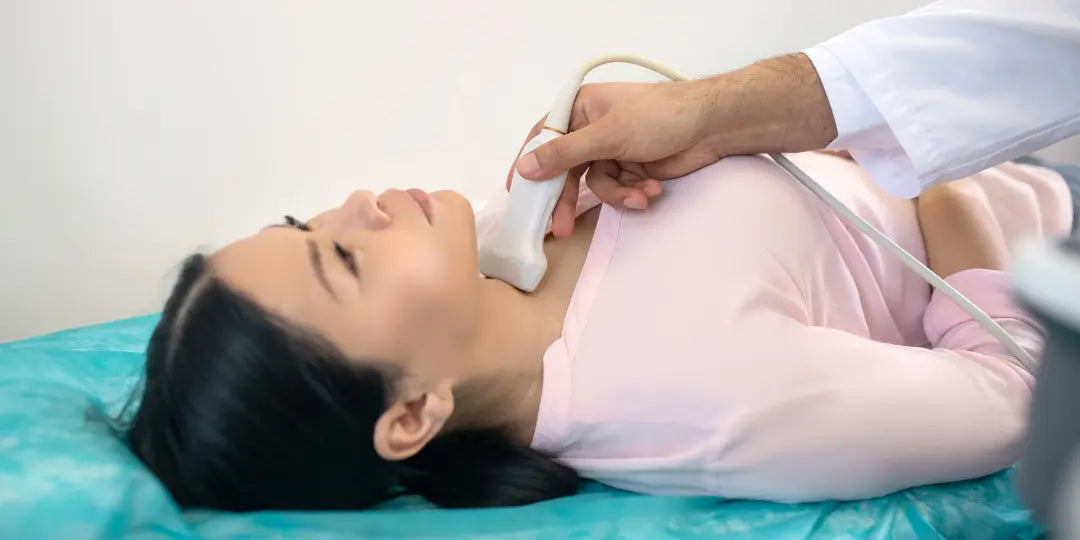Have you ever heard of Hashimoto's disease? It is an autoimmune condition mainly related to the thyroid. In fact, here, the immune system mistakenly attacks this gland located at the base of the neck, which leads to chronic inflammation. But how do you recognize Hashimoto's disease? What are the symptoms and causes? How to diagnose it? Find out all about it in our article.
Learn more about Hashimoto's disease
What is Hashimoto's disease?
Hashimoto's disease, also called chronic lymphocytic thyroiditis , is an autoimmune disease where the immune system attacks the thyroid gland . When attacked, the thyroid becomes inflamed and slows down. As a result, there is a decrease in the production of thyroid hormones . And in the long term, this reduction in hormone production leads to permanent hypothyroidism; which results in affecting not only the metabolism, but also many other systems in the body.
Some key figures about Hashimoto's disease
Today, Hashimoto's disease is estimated to affect about 5% of the world's population , and this figure continues to grow. In addition, this autoimmune condition is estimated to be about eight times more common in women than in men. While there is currently no explanation for this, hormonal factors may play a role. Furthermore, Hashimoto's disease occurs mainly in middle-aged adults , but this does not exclude younger people. Finally, it is a disease that is quite common in people with a family history of thyroid disorders .
What are the symptoms of Hashimoto's disease?
Physical symptoms
The symptoms of Hashimoto's disease are quite numerous, which is why it can be difficult to diagnose. Among the physical symptoms, here is a list of what people with Hashimoto's may experience:
- Excessive fatigue : Intense and persistent fatigue, despite a good night's sleep, is one of the most common and significant symptoms of the disease.
- Unexplained weight gain : Thyroid hormones regulate metabolism, and therefore the body's ability to burn calories. When there is a hormone deficiency, metabolism slows down, which can lead to unexplained weight gain.
- Sensitivity to cold : A malfunction of the thyroid often causes a feeling of chilliness, because the thyroid is involved in thermal regulation.
- Skin problems : Skin may become dry, pale and cold to the touch. Hair may become dry, brittle and fall out more easily. Some people even experience itching in certain areas.
- Menstrual disorders : In women, the disease can cause irregularities in the menstrual cycle, with heavier or irregular periods. In some cases, this can even lead to infertility.
Emotional and cognitive symptoms
Hashimoto's disease affects not only the body, but also the mind. So after the physical symptoms, let's now talk about the emotional and cognitive symptoms:
- Depression and Anxiety : Reduced thyroid hormones affect the production of serotonin. Thus, people with Hashimoto's often experience episodes of intense sadness, depression, and anxiety.
- Brain fog and memory problems : Hashimoto's can cause what is called "brain fog," which includes difficulty concentrating, frequent forgetfulness, and difficulty remembering simple facts.
- Loss of motivation and apathy : A decrease in motivation can be observed in people with this disease. Certain daily activities become more difficult to perform, which can ultimately harm the overall quality of life.
What causes Hashimoto's disease?
Genetic causes
Increasingly, genetic predisposition plays an important role in the development of Hashimoto's disease. Indeed, several studies have shown that people with a family history of thyroid disorders, including other autoimmune diseases, have a higher risk of developing the disease than other average people.
Environmental factors
Apart from genetic predisposition, there are also external factors that can trigger or worsen Hashimoto's disease, such as:
- Iodine deficiency : A lack of iodine can impair thyroid function. In areas of the world where the diet is low in iodine, there is a higher prevalence of thyroid disorders.
- Chronic stress : Emotional and physical stress disrupts the immune system, which can increase the risk of an autoimmune attack on the thyroid.
- Viral infections : Certain viral infections may also play a role in triggering Hashimoto's, as they can stimulate an excessive immune response.
A link with other autoimmune diseases?
People with Hashimoto's disease are at increased risk of developing other autoimmune diseases . These include type 1 diabetes, lupus, and rheumatoid arthritis. This is due to the general disruption of the immune system , which can then attack various tissues in the body .
How is Hashimoto's disease diagnosed?
A clinical examination and medical history
Typically, the diagnosis of Hashimoto's disease is based primarily on a combination of physical examination and discussions about the person's family history , particularly with regard to thyroid diseases, but also more generally autoimmune diseases. Note that during the examination, the doctor usually checks for a goiter, a sign of inflammation of the thyroid.
Laboratory analyses
To complement the initial diagnosis made following a clinical examination by a professional, blood tests are often prescribed. These tests include:
- TSH : If TSH is high, it means that the pituitary gland, which regulates the thyroid, is trying to compensate for low thyroid hormone levels.
- Antithyroid antibodies : the presence of antithyroid antibodies (anti-TPO and anti-Tg) confirms the autoimmune nature of the disease.
- T3 and T4 : T3 and T4 measurement directly assesses the level of thyroid hormones, indicating the degree of hypothyroidism.
Other tests, if necessary
Finally, an ultrasound of the thyroid may also be performed. This examination allows the size and texture of the gland to be observed, and any nodules to be detected. It also allows the progression of the inflammation to be assessed.
Conclusion
Finally, Hashimoto's disease is a chronic condition that, although complex, can be effectively managed with early diagnosis and appropriate medical follow-up. If you have any doubts, monitor your physical and emotional symptoms before going to see a healthcare professional who will establish an accurate diagnosis based on a clinical examination, blood tests and an ultrasound. And don't worry, by adopting a healthy lifestyle and following the prescribed treatments, it is possible to live normally and limit the impacts of the disease on daily life.






